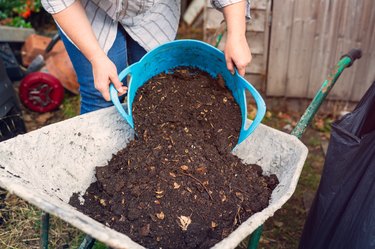
Gardeners use many materials to encourage the growth of foliage and the development of fruit, including fertilizers with different proportions of nitrogen, phosphorus, and potassium. For those who prefer more natural soil conditioning and fertilizing agents, compost and manure are totally organic, relatively inexpensive, and don't hurt the environment when they run off into nearby streams and rivers. While both are effective as soil amendments, they're formulated and used differently. The difference between compost and manure is that compost consists of various decomposed organic materials, while manure is primarily feces from certain types of livestock.
What Is Compost?
Video of the Day
Compost is the product of decomposed organic material. It's a fluffy, humus-like material that's made with a specific method of processing yard trimmings, wood chips, paper products, and other materials. Compost is created by natural decomposition and chemical processes. Adding compost supplies nutrients that are essential for plant growth. Compost is also a good soil amendment, adding density, increasing porosity, and reducing compaction.
Video of the Day
How Is Compost Made?
A bin or container is used to hold the composting ingredients. For backyard gardeners, a 3-by-3-by-3-foot container that allows air to circulate is sufficient. A mixture of brown agents like dried leaves, twigs, and straw is added to a mixture of green ingredients like grass clippings, kitchen scraps, and coffee grounds in a 2-to-1 ratio.
This mixture is kept moist to about the consistency of a wrung-out sponge, and the mixture is turned regularly. Turning it prevents it from creating foul odors. When this mixture looks and smells like rich topsoil, it's ready to be used in the garden. You can also buy prepared compost if you don't have the space or time for a home compost pile.
What Is Manure?
Manure contains feces, urine, spilled feed, bedding, and runoff from livestock. It improves soil texture, aeration, water filtration ability, and ability to hold moisture. Your garden gets nitrogen, phosphorus, potassium, and other nutrients from manure, which are released slowly. However, fresh manure has ammonia and nitrogen levels that are usually too high for plants and can burn them.
Manure must be processed to remove E. coli and other contaminants so that it's safe to use. This can be done commercially with heat, or it can be done through a composting process in which the manure is mixed with straw or animal bedding and allowed to heat to 131 to 140 degrees Fahrenheit over the course of several weeks. Composting manure requires regular turning to make sure all of the manure reaches the higher temperatures. It can be difficult to meet these conditions in a home compost pile. You can buy composted manure that's ready to use.
Best Sources of Manure
Manure quality varies based on several factors, including the type of animal and its condition. Collection and storage methods as well as how fresh the manure is also play a role in how well it helps your garden. Even the food the animal eats and the bedding that gets mixed into the manure can change its quality. Common sources of manure for gardens include:
- Chickens
- Cows
- Sheep
- Horse
- Llama
- Goat
Avoid using manure from other animals, especially pigs, cats, and dogs, which can be dangerous due to the pathogens in it.
How to Use Compost
Compost is effective in gardens as a mulch material on the surface. You can also work it gently into the topsoil about 4 to 6 inches deep to improve texture and moisture-holding ability. This works best in the spring before you start planting your garden. To give your lawn a boost in nutrients, sprinkle the compost in a thin layer over your lawn, ideally after you aerate the lawn, and let it settle down to the soil.
How to Use Manure
Processed manure is added to garden soil by spreading it on the surface or working it gently into the soil. Fall or winter is the ideal time to add manure to your garden. If you're using manure to add nutrients and not to change the soil structure, top your soil with a few inches of composted manure. To improve the soil structure, work the manure 4 to 8 inches into the soil.